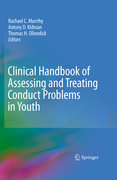
Clinical handbook of assessing and treating conduct problems in youth
Murrihy, Rachael C.
Kidman, Antony D.
Ollendick, Thomas H.
Conduct problems, particularly oppositional defiant disorder (ODD) and conduct disorder (CD), are the most common mental health problems affecting childrenand adolescents. The consequences to individuals, families, and schools may be severe and long-lasting. To ameliorate negative outcomes and ensure the mosteffective treatment for aggressive and antisocial youth, early diagnosis and evidence-based interventions are essential. Clinical Handbook of Assessing andTreating Conduct Problems in Youth provides readers with both a solid grounding in theory and a comprehensive examination of the evidence-based assessment strategies and therapeutic practices that can be used to treat a highly diverse population with a wide range of conduct problems. It provides professional readers with an array of evidence-based interventions, both universal and targeted, that can be implemented to improve behavioral and social outcomes in children and adolescents. This expertly written resource:; Lays the foundation for understanding conduct problems in youth, including epidemiology, etiology, and biological, familial, and contextual risk factors.; Details the assessmentprocess, with in-depth attention to tools, strategies, and differential diagnosis.; Reviews nine major treatment protocols, including Parent-Child Interaction Therapy (PCIT), multisystemic therapy (MST) for adolescents, school-basedgroup approaches, residential treatment, and pharmacotherapy.; Critiques thecurrent generation of prevention programs for at-risk youth.; Explores salient issues in working effectively with minority youth.; Offers methods for evaluating intervention programs, starting with cost analysis. This volume servesas a one-stop reference for all professionals who seek a solid grounding in theory as well as those who need access to evidence-based assessment and therapies for conduct problems. It is a must-have volume for anyone working with at-risk children, including clinical child, school, and developmental psychologists; forensic psychologists; social workers; school counselors and allied professionals; and medical and psychiatric practitioners." Provides an all-inclusive, comprehensive balance of theory and applied practice, unlike most books on the market that tend to focus on either theory or application, but not both. Fifty percent of the overall content comprises therapeutic guidelines for evidence-based treatment. Offers comprehensive coverage of assessment techniques. Provides numerous case studies that detail the use of treatment. INDICE: PART I: AN INTRODUCTION TO OPPOSITIONAL DEFIANT DISORDER AND CONDUCT DISORDER: CLASSIFICATION, EPIDEMIOLOGY AND ETIOLOGY.- Phenomenology of Oppositional Defiant Disorder and Conduct Disorder.- Conduct problems in youth: A sociological perspective.- Etiology of ODD and CD: Biological, familial and environmental risk factors identified in the development of disruptive behaviur disorders.- Integrating etiological factors in ODD and CD: A transactional model.- Devising a treatment plan: Assessment, differential diagnosis and functional analysis for treatment formulation.- PART II: EVIDENCE-BASED TREATMENTS OFCONDUCT PROBLEMS: AN APPLIED APPROACH FOR PRACTITIONERS.- An Overview of evidence-based treatment for preschoolers, children, and adolescents with ODD and CD (indicated interventions).- Parent Child Interaction Therapy for preschool children with conduct problems.- Parent Management Programs for Children.- Cognitive behaviour therapy for the group-based treatment of oppositional youth.-Functional family therapy.- Multisystemic Therapy for the treatment of behaviorally disturbed adolescents.- Aggression management programs for youth in alternative school settings.- Residential and hospital treatment centers for children and adolescents with conduct problems.- Alternative treatments for conduct problems: Wilderness and boot camps.- Pharmacology for children and adolescents with ODD and CD.- Case Studies.-PART III: LOOKING FORWARD: PREVENTION PROGRAMS AND ADVANCED TREATMENT CONSIDERATIONS.- Prevention: Early intervention programs for universal and selected populations.- Treating children and adolescents with disruptive behavior disorders from ethnically diverse backgrounds.- Evidence-based treatment programs for conduct problems: Are they cost effective?.- Epilogue: Future directions in research and practice for disruptive behavior disorders.
- ISBN: 978-1-4419-6295-9
- Editorial: Springer
- Encuadernacion: Cartoné
- Páginas: 500
- Fecha Publicación: 29/07/2010
- Nº Volúmenes: 1
- Idioma: Inglés
